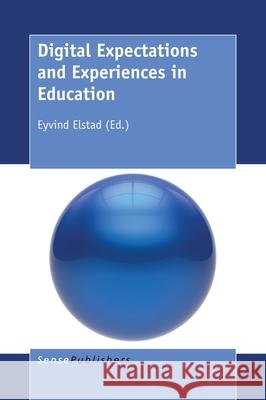Digital Expectations and Experiences in Education » książka
Digital Expectations and Experiences in Education
ISBN-13: 9789463006460 / Angielski / Miękka / 2016 / 270 str.
Digital Expectations and Experiences in Education
ISBN-13: 9789463006460 / Angielski / Miękka / 2016 / 270 str.
(netto: 234,73 VAT: 5%)
Najniższa cena z 30 dni: 236,46
ok. 30 dni roboczych.
Darmowa dostawa!
For more than three decades, researchers, policy makers and educationalists have all harboured great expectations towards the use of technology in schools. This belief has received a hard knock after an OECD 2015 report has shown that computers do not improve pupil results: Investing heavily in school computers and classroom technology does not improve pupils' performance, and frequent use of computers in schools is more likely to be associated with lower results. Educational technology has raised false expectations The prevailing view of educational technology has shifted. Nevertheless, hardly anyone wishes for a situation in which pupils do not use technology in the service of learning: education is supposed to prepare for the future, and it is evident that technology is one of the answers to the challenges of the future. Many school professionals, however, feel uncertain how schools should tackle challenges relating to the distractions that hamper in-depth learning, easy cut-and-paste solutions and online offensiveness that occur while pupils are at school. The initiative to provide a tablet or PC for each pupil is continuing despite a lack of evidence that it is beneficial to learning. School professionals and policy makers are seeking answers to the question of how schools ought to relate to challenges created by the use of technology in the school. This book is an attempt to raise questions and start a debate. It presents new research relevant to a better understanding of the challenges and opportunities inherent in educational technology and strategies are discussed in relation to handling these challenges. Rather than presenting ready solutions, the book attempts to provoke debate and to contribute to a firmer grasp on reality. The chapters in this volume offer an up-to-date discussion. In tackling the critical issues created by educational technology, this book provides an important resource for student teachers, teachers, education scholars and those interested in a critical examination of digital expectations and experiences in school education. The authors do not present a common front on the complex question of the proper use of technology in the school but instead present a diversity of arguments and viewpoints.
For more than three decades, researchers, policy makers and educationalists have all harboured great expectations towards the use of technology in schools. This belief has received a hard knock after an OECD 2015 report has shown that computers do not improve pupil results: Investing heavily in school computers and classroom technology does not improve pupils performance, and frequent use of computers in schools is more likely to be associated with lower results. Educational technology has raised false expectations! The prevailing view of educational technology has shifted. Nevertheless, hardly anyone wishes for a situation in which pupils do not use technology in the service of learning: education is supposed to prepare for the future, and it is evident that technology is one of the answers to the challenges of the future. Many school professionals, however, feel uncertain how schools should tackle challenges relating to the distractions that hamper in-depth learning, easy cut-and-paste solutions and online offensiveness that occur while pupils are at school. The initiative to provide a tablet or PC for each pupil is continuing despite a lack of evidence that it is beneficial to learning. School professionals and policy makers are seeking answers to the question of how schools ought to relate to challenges created by the use of technology in the school. This book is an attempt to raise questions and start a debate. It presents new research relevant to a better understanding of the challenges and opportunities inherent in educational technology and strategies are discussed in relation to handling these challenges. Rather than presenting ready solutions, the book attempts to provoke debate and to contribute to a firmer grasp on reality. The chapters in this volume offer an up-to-date discussion. In tackling the critical issues created by educational technology, this book provides an important resource for student teachers, teachers, education scholars and those interested in a critical examination of digital expectations and experiences in school education. The authors do not present a common front on the complex question of the proper use of technology in the school but instead present a diversity of arguments and viewpoints.











